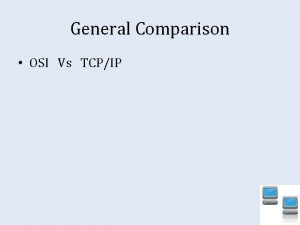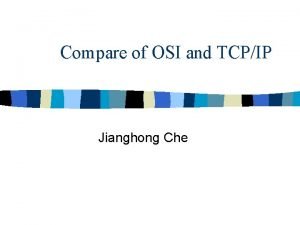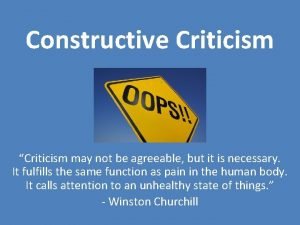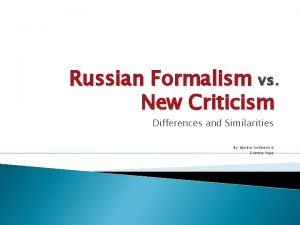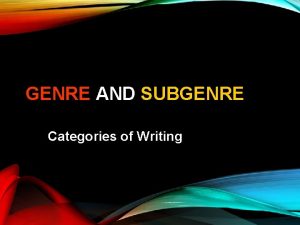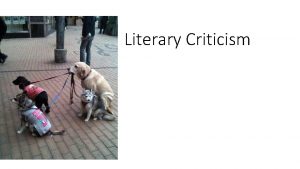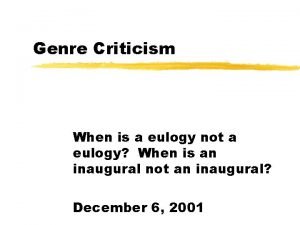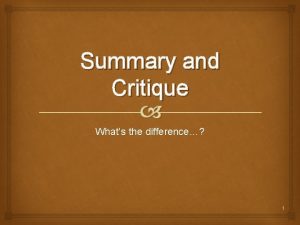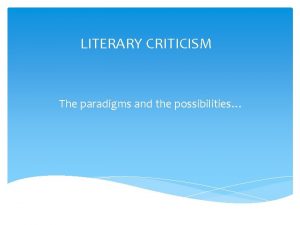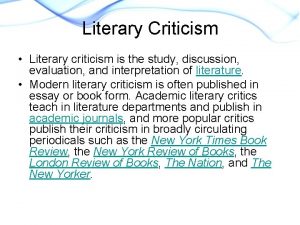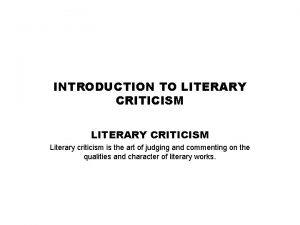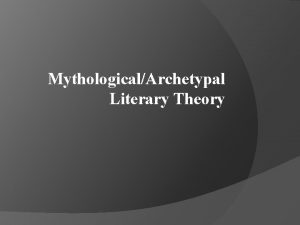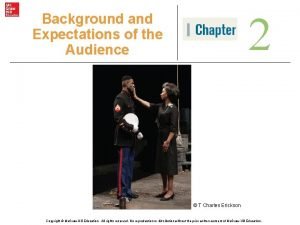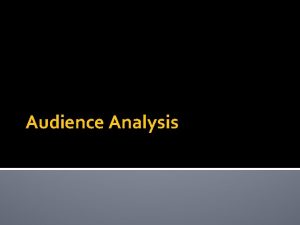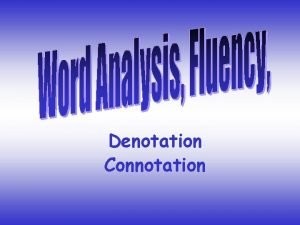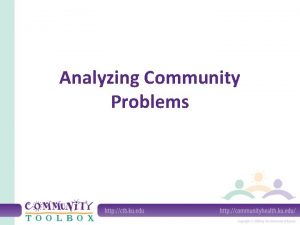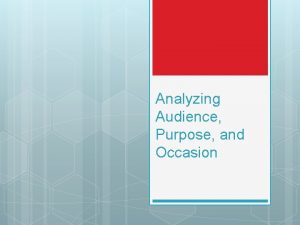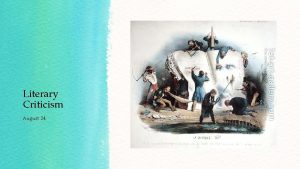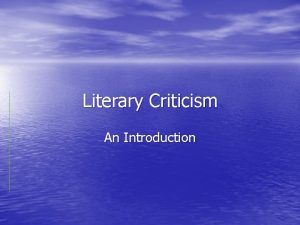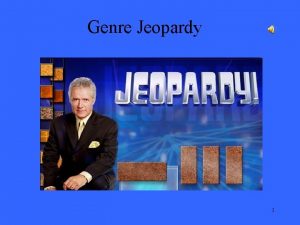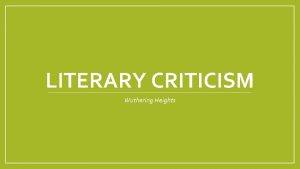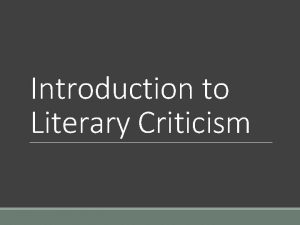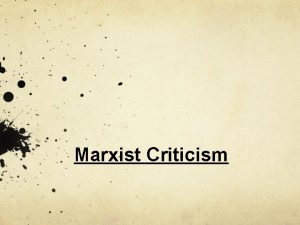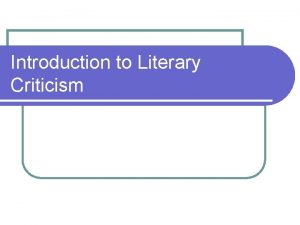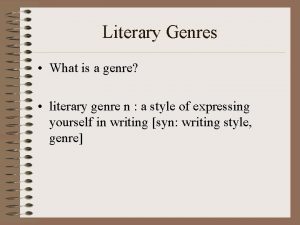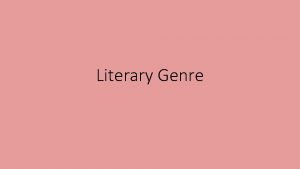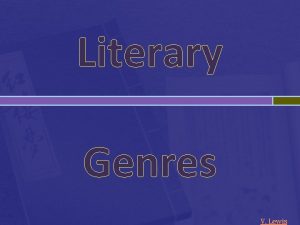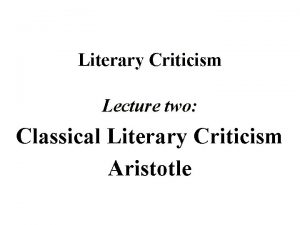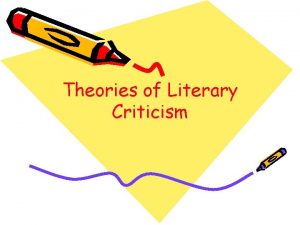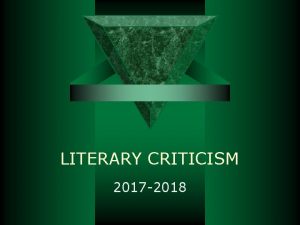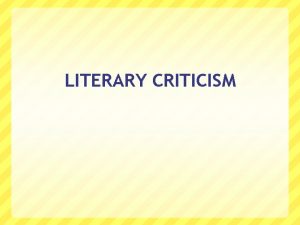Literary Criticism Genre Criticism You analyze and critique


















- Slides: 18

Literary Criticism

Genre Criticism • You analyze and critique a work based on its genre. • We have certain expectations about what we will find in certain genres. • Example: epic poems have particular characteristics such as a great hero, supernatural aid, and long journey’s full of physical and emotional conflict. • We judge a work based on how well it represents the genre. • You determine a genre based on the characteristics of the text. Then you analyze it based on the genre.

Historical and Biographical • You have been using these since you have been reading in school. You look at the historical context of the piece and the author’s life in order to find meaning in the work. • We are doing this now with Heart of Darkness.

Schools of Literary Criticism: Formalism • Formalism is a school of literary criticism and literary theory having mainly to do with structural purposes of a particular text. • In literary theory, formalism refers to critical approaches that analyze, interpret, or evaluate the inherent features of a text. Theses features include not only grammar and syntax but also literary devices such as meter and tropes. The formalist approach reduces the importance of a text’s historical, biographical, and cultural context. • Formalism rose to prominence in the early twentieth century as a reaction against Romanticist theories of literature, which centered on the artist and individual creative genius, and instead placed the text itself back into the spotlight, to show the text was indebted to forms and other works that had preceded it.

Schools of Literary Criticism: Formalism Sometimes Called “New Criticism” • Close Reading: Look closely at the forms and structures of the work. • Examine closely the linguistic images and the various connotations of the words used. • Look at the meanings of names. • Look at what is left out of the story.

Schools of Literary Criticism: Formalism • Typical questions: • How does the work use imagery to develop its own symbols? (i. e. making a certain road stand for death by constant association. ) • What is the quality of the work’s organic unity “…the working together of all the parts to make an inseparable whole…”? In other words, does how the work is put together reflect what it is? • How are the various parts of the work interconnected? • How do paradox, irony, ambiguity, and tension work in the text? • How do these parts and their collective whole contribute to or not contribute to the aesthetic quality of the work? • How does the author resolve apparent contradictions within the work? • What does the form of the work say about its content? • Is there a central or focal passage that can be said to sum up the entirety of the work? • How do the rhythms and/or rhyme schemes of a poem contribute to the meaning or effect of the piece?

Schools of Literary Criticism: Psychoanalytic • Psychological Explanations That Apply to Literature: • 1. The unconscious and its influence on human behavior. • 2. Conflict in a character’s view of himself versus other views of the character. • 3. Conflict in a character’s relationships with other characters. • 4. Sexuality either expressed or repressed. • 5. Dreams • 6. Symbols: Both dreams and symbols are keys to determining what is beneath the surface of an individual’s personality.

Schools of Literary Criticism: Psychoanalytic • Writing Psychological Criticism: • What do you see as the main traits of the character? • How are those traits revealed? • What does the narrator reveal about the character? • Does the character change? If so, how? • Does the character come to understand something not understood at the outset? • How does the character view himself or herself? • How is he viewed by other characters? Is there a conflict? • What images are associated with the character? • Which symbols are connected with the character?

Writing Psychoanalytic Criticism • Does the character have any interior monologues or dreams? If so, what do you learn about the character that is not revealed by outward behavior or conversation? • Are there conflicts between what is observable and what is going on inside the character? • Where do the characters act in ways that are inconsistent with the way they are described by the narrator or perceived by other characters? • How can you explain a character’s motivation? What causes do you find? What motivation?

Writing Psychoanalytic Criticism • Reveal what is happening in the character’s unconscious as it has been suggested by images, symbols, or interior monologues. • Identify the nature of the character’s conflicts. • Assess the meaning of any changes. • Examine whether a character operates according to the pleasure principle, the morality principle, or the reality principle. • Explain whether a character’s typical behavior is balanced or dominated by the id or the superego. • Look carefully at any dreams. What repressed material are they putting into symbolic form? What are they really about? • Probe the meanings of symbols in terms of their maleness or femaleness. • Find any unresolved issues the character faces. • Note any conflicts or events in the author’s life that are reflected in the text.

Schools of Literary Criticism: Marxist • Based on the work of Karl Marx and Freidrich Engels • Mid 19 th Century • The German Ideology (1846) • The Communist Manifesto (1848) • Influenced by Darwin’s Theory of Evolution, Marx and Engels theorized that the social and political history of humans has evolved also. • Ideology of a society is determined by the dominant economic and political class in order to exploit the “proletariat” or working class.

Schools of Literary Criticism: Marxist Underlying purpose of ideology is to justify the power of the dominant class and to enable that class to maintain its control over the working class. Proletariat becomes enlightened (by a philosopher like Marx) and decides to take control of its own destiny. The controlling class is overthrown and the society becomes more economically and socially equitable. This cycle continues and each time there is an imbalance, an evolutionary adjustment is made by the working class.

Applying Marxism to Literary Criticism • Strict adherents of Marxism explain literary works as products of the economic and ideological ideas of their time period. • For example, Stalin’s regime in the Soviet Union decided that literature must conform to the “Party Line, ” that is, support the state and its ideology. • Other theorists take a broader view of Marxist interpretation. • Georg Lukacs feels that works of literature and art are more independent and unique but should be realistic and represent the social and economic conflicts facing “typical” people. • Louis Althusser took Marxism to a new level by suggesting that literature and art can affect society and lead to important changes.

Applying Marxism to Literary Criticism • Look for the material circumstances and ideological atmosphere of the society in the setting of the literary work. • Who has the economic, political, and social advantages in the text? • Does the work support the prevailing powerful class while continuing its hidden support of the exploitation of the underclass? • Does the exploited class recognize its position and struggle against it? • Is the working class shown as happy with their lot in life? • Marx and Engels believe that people are products of their cultural and social circumstances, and to understand people, we must observe their physical world.

Applying Marxism to Literary Criticism • Marx believed that religion was one method of keeping the lower class of society in its place. “Religion is the opium of the people. ” • Does religion play a role in the oppression of people in a literary text? • Alienation and fragmentation in the lives of individuals is an important theme for the Marxist critic. • Realistic writers like Shakespeare and Dickens were favorites of Marx because they represented an accurate portrayal of the lives of the proletariat as well as class struggle. • Joyce and Proust, modernist writers, use their style of writing to show the brutal class system creates feelings of alienation in people as well as fragmentation of the classes.

Schools of Literary Criticism: Feminism • Derived primarily from the social and political movement for women’s rights and equality in society. • Separate from Marxist and Freudian criticism which are both maledominated. • Identifying specific female subject matters in literature that concern personal issues about women is one tenet. • Exposing the feminist tradition in literary history is another. • Describing a particular feminine mode of experience; women are not like men and don’t experience the world in the same way. Women should be able to advance and be accepted on their own merits and distinct natures.

Schools of Literary Criticism: Feminism • Feminist analyses have been helpful in bringing to the forefront many female authors who have previously been relegated to the background. • Also, the advancement of certain types of writing as examples of literature from the feminine perspective is beneficial to all society. • These literary types include journals, diaries, and letters. • Ecofeminism: Uses the image of the female as the “land” or natural environment. That nature must be conquered and dominated by men is a an age-old theme in culture and literature. The male conqueror as the phallic symbol and the female environment as the yonic symbol are the basic components of ecofeminism.

Reading Literary Texts from the Feminist Perspective • Read a text from the feminine point of view. • Look for the female experience that is different than the way a male experiences the same situation. • How would the story be different if a female was the protagonist? • Look for female stereotypes. • What roles do women play in the story? • How do male characters talk to and about the female characters? • How do male characters treat the female characters? • Examine the images and language for gender characteristics.
 Iso/osi vs. tcp/ip
Iso/osi vs. tcp/ip Comparison and critique of osi and tcp/ip model
Comparison and critique of osi and tcp/ip model Constructive criticism vs criticism
Constructive criticism vs criticism Similarities between formalism and new criticism
Similarities between formalism and new criticism As i was saying by augustus gluten
As i was saying by augustus gluten What is genre criticism
What is genre criticism What is genre criticism
What is genre criticism Whats a summary
Whats a summary 4 critical variables of literary theory and criticism
4 critical variables of literary theory and criticism Literary evaluation
Literary evaluation Advantages and disadvantages of literary criticism
Advantages and disadvantages of literary criticism Mythological literary criticism
Mythological literary criticism Bible verses about constructive criticism
Bible verses about constructive criticism Descriptive criticism vs prescriptive criticism
Descriptive criticism vs prescriptive criticism Psychographic audience analysis
Psychographic audience analysis Connotation of commitment
Connotation of commitment Brutal connotation
Brutal connotation Community problems examples
Community problems examples Analyzing the audience
Analyzing the audience
